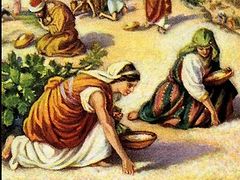If we look at the order of day of an average contemporary man we will most probably see the following: home—work—home. On a larger scale, we will also find shopping, spending weekends in the country, meeting with relatives and friends. Life goes on, he or she works and thinks: how to save up money for holidays (to the seashore or, preferably, abroad), for renovation of the flat… and to send the child to school.
Jeans, jobs, sale!
A text message comes from his favorite clothing store informing that huge discounts are at hand and he feels he needs to renew his wardrobe. In a word, he has a whole lot of problems to solve promptly, preferably without headache and complications. And there is no getting away from it: he has to worry about his future, not least about tomorrow, all the time.
But suddenly this person ventures to read the Gospel. He had been interested in this book for a long time, but had been too busy. So he takes and reads the Gospel from cover to cover. And what does he find there? Therefore I say unto you, Take no thought for your life, what ye shall eat, or what ye shall drink; nor yet for your body, what ye shall put on. Is not the life more than meat, and the body than raiment? (Mt. 6:25).
What should he do? His parents will come to see him tonight and he must find time to go and buy a cake, and his wife is cooking some very tasty treats in the kitchen… And the all-important discounts will come up in a couple of days! “Am I really not supposed to buy new jeans for myself, according to the Gospel?!” he will ask. The Word of God says: Behold the fowls of the air: for they sow not, neither do they reap, nor gather into barns; yet your heavenly Father feedeth them. Are ye not much better than they? Which of you by taking thought can add one cubit unto his stature? And why take ye thought for raiment? Consider the lilies of the field, how they grow; they toil not, neither do they spin: And yet I say unto you, That even Solomon in all his glory was not arrayed like one of these. Wherefore, if God so clothe the grass of the field, which today is, and tomorrow is cast into the oven, shall he not much more clothe you, O ye of little faith? (Matt. 6:26-30).
How should we take this?! It looks like we are called only to live for the day, without looking ahead. And what is more, we should even stop worrying about today—about food, clothes, duties of this day, because all of them are meaningless. All we should do is just wait quietly until all these things “fall from heaven”! Otherwise how can we become like “the fowls of the air”? Or another reaction is possible: “All these words were addressed to spiritually mature people—the saints who renounced the world, retreated to deserts and spent all their lives in prayer.” There is no other way. A wife may say to her husband: “Listen, my dear, I won’t cook anything henceforth because worrying about food is a sin.” Or a husband may say to his wife: “I have come to the conclusion that I don’t need to work any more. I want to be like a flower, which grows by itself, neither toiling nor spinning. And all the rest comes from the evil one.” Doesn’t it sound odd? But, according to these people’s interpretations, this is “in agreement with the Gospel”! Somebody may argue and say: “No, this nonsense cannot come into normal people’s heads.” But I can assure readers that these examples are not inventions at all. An acquaintance of mine once opened the Gospel for the first time and immediately asked me, “So it means that I should give up my studies, care about nothing and stop seeking means of subsistence? The Gospel says very clearly, take no thought for your life.”
Then should we take care of ourselves or not?
What did our Lord Jesus Christ actually mean by these words? It may seem that there are only two alternatives here: to be idle and wait for “manna from heaven”, or to live a “normal” ordinary life with all its cares, shopping, yearning for a better job and a higher income. But in the second case it means opposing the Gospel! All in all, “it is so difficult and obviously not for me!” Even the very expression “live for the day” (or “live for the moment”) has a rather negative meaning nowadays. It commonly refers to someone who lives without worrying about the future and takes the life too heedlessly.
However, if we take a more careful look at the Gospel we will see more. Yes, Christ said, take no thought for your life, but as we read the Gospel further we find that the disciples of Christ continued their work as fishermen (see Lk. 5:5-6; Jn. 21:3). Even the Savior Himself, as we see, accepted dinner invitations more than once and was a guest at a wedding party. Pharisees even scolded Christ for “eating and drinking with tax collectors and sinners” (see, for example, Mt. 11:19). And now we come across a “controversy”: It appears that Christ taught people not to worry about tomorrow (what we shall eat or drink), but at the same time He did not refuse the food and drink that others offered Him. After all, judging by the logic of His teaching, He was supposed to turn down all these invitations. People saw to it that Christ was fed, thus disobeying His command.
Another example: The Holy Apostle Paul was a tentmaker (Acts 18:3). It was a “lucrative” yet difficult way of earning money. Tents were made of various materials at that time: wool, leather or linen. They first made multiple strips and then sewed them together. And tents could be very different in size, from small to big; and they were designed for various purposes—from a mere canopy to a tent for long journeys. Significantly, the apostle said more than once in his Epistles that thanks to his trade he managed to support himself and his companions (see Acts 20:34; 1 Cor. 4:12). More than that, in one of his epistles St. Paul proclaims, If any would not work, neither should he eat (2 Thess. 3:10). What should we do? How can we “blend” and understand these things?
The right understanding of this should be the following: Christ teaches all of us to have a right attitude towards food, clothes, concerns, other people and God. Christ’s words that our “heavenly Father feedeth the fowls” is an example of our attitude towards Divine providence. If God doesn’t forget the birds and flowers, then can He forget humans? All of us are preoccupied with taking care of our bodies and often forget about our souls, which need even more care than bodies. Thus Christ tells us in His message, “in being concerned for your material well-being, you should also be concerned for your spiritual welfare. Seeking this-worldly good things (money, possessions, etc.), you shouldn’t forget about the heavenly treasures—namely good works, faith, love and charity.”
We can also remember one of the ten main commandments of the Old Testament, which reads: Six days you shall labor and do all your work, but the seventh day is a sabbath to the Lord your God (Exod. 20:9-10). We will not find any place in the Gospel where Christ abolishes this commandment. Does Christ ask for too much? No, only for one day of the week. His words can be interpreted as a reminder that we must devote one of the seven days of a week to God and our souls. We take care for material things on six days, and it’s time to occupy ourselves in spiritual things on Sundays.
But if we have nothing to eat tomorrow?
Are the words of Christ relevant for us today? Absolutely! All the more so because the modern world requires a pace of life which is more complex and eventful than before. New cares appear each day, and it seems that there is no end to them. But at least once a week we should stop and remember God and our souls; remember that apart from our personal concerns, there are people around us who need our care and attention.
Another question then arises: Will it be a sin if we desire to find a better job, to earn additional income? (These things are especially relevant during a protracted financial crisis!) Or a desire to move into a new flat, which will require considerable additional expenses? How does all of this correlate with the words of the Savior?
I was asked this question many times. And as a priest I remind people of the commandment from the Gospel: Thou shalt love thy neighbor as thyself (Mt. 22:39). The Lord by no means forbids us to love ourselves; therefore He allows us to take care of ourselves, to desire and seek good for ourselves. Care is a demonstration of love. It is egoism that becomes a real sin, when we forget that there are other people around us besides our egos. If we translate the words of the commandment into modern language we will have something like this: “Your ego is not the center of the universe; do not forget other people around you.” Thus, your desire to have additional income shouldn’t degenerate into greed for money and covetousness. Making money “at any cost” inevitably becomes a sin.
If the Church is superseded by your nearest shopping and entertainment center that devours all your attention, if you give top priority to “huge discounts” (though you don’t necessarily need all these things), then it can be said with certainty that daily wants have become a sort of idol for your, which has replaced God in your heart. Material things must not have dominion over us—it should be the opposite. This is the hidden meaning in the words of Christ.
However, we can approach this Gospel phrase from a different perspective. Everybody knows that sometimes even a minor problem can drive somebody to a frenzy. How should we live in such situations? How can we avoid utter nervous exhaustion? How can we aviod overtaxing our strength in our struggle for survival? After all, we are not sitting idle but “toiling in the sweat of your brow”, trying to overcome difficulties, even though they keep multiplying. Or you may finally think, “But if I have nothing to eat tomorrow?”
I believe that Christ, cautioning us against excessive care for secular things, is calling upon us to trust God, to rely on Him wholeheartedly. To believe that help will come and the seemingly insurmountable difficulties will be overcome. Faith means trust. Without trust, any relationships with both God and people are impossible. Christ wants us to learn to put our trust in Him. Where there is trust, there is hope; and if there is hope, then all the things we are most afraid of appear to be no more than obstacles that we just need to step over.
Saratovskaya Panorama, No. 33 (1114), August 23, 2017



